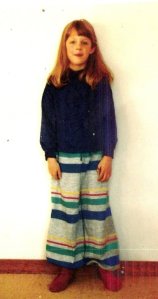When I was growing up, we were not allowed to use the F-word in my house. However, the F-word that I am referring to is probably not the one that you are most familiar with. In my house, the F-word was feminism. Don’t get me wrong, the people in my family were all for equal rights and equal pay for women, but for some reason there was always a tense silence whenever the topic of feminism was brought up. These conversations were often followed by whispers of “You don’t want to be known as a man-hater, honey.” I am writing this blog partly in response to an article by a young feminist from my alma mater the University of Kansas who recently wrote about the importance of restoring feminism’s image in the public eye.
As the Student Coordinator of the LPTS Women’s Center and a long-time feminist activist, I work with women all of the time who are uncomfortable using the word feminism. However, almost everyone embraces “women’s issues” or “women’s advocacy”. Just as Sharon Daloz Parks, author of Big Questions, Worthy Dreams, believes that everyone is spiritual because everyone “makes meaning” out of the world, I believe that the vast majority of women are feminists, but just don’t know it. Whenever I ask a group of women, “Is domestic violence ever okay?”, I am always met with a resounding “No!”. However, many of these women still scoff when they hear the word feminism. Personally, I only use the word feminism with a trusted group of people who self-identify that way. Rarely, I will use it if I know that a woman is at the point of raising her consciousness and being open to learning the history and what the word feminism really means.
I don’t think we need to take back “feminism” or re-image it. I think the young women who take this perspective are new to feminism and worried about gaining approval from other people. One of the best things feminism has taught me is that it is okay to be who I am, even if other people disagree, and especially in the face of injustice. However, I am totally okay with using other words for “feminism” if it helps us to reach our ends, which are more important than the means. The best example of this comes from the women in my family.
As I stated earlier, I grew up hearing all kinds of negative stereotypes about “feminists” from female relatives. However, these stereotypes had nothing to do with the real work of feminism, which is about justice. My relatives were never railing against equal rights for women. My mother is very proud of the work that I do, and she has chosen to describe me to the rest of our family as a “woman’s advocate”. For some reason, this is language that they can understand and relate to. Some of my favorite moments in the world happen during the holidays when the women separate from the men and go off by themselves to talk.
During these private moments, my mother will usually tell some kind of story about how I am challenging the system, whether in a personal relationship or in the professional work that I do. A look of surprise mixed with hope and yearning often comes over the faces of my female relatives. I am cheered on all the time behind doors for doing and saying the things that other women are afraid to say or do and for championing their causes. I am the hero who lives behind closed doors. And, every once in a while, a woman will come back to me and share a story about how she stood up for herself and what a liberating experience it was. Women are creating new relationships with their husbands, fathers, in the workplace and with each other. This is why I do the work that I do, and it matters less to me the words that are used than if people feel a new sense of liberation or justice in their own lives.
Slowly but surely, the closed doors to these private women’s spaces are opening this holiday season, and with much courage trepidation, a woman is about to put her foot outside of this door and take her first step toward her own liberation. Maybe this woman is you. Remember, as activist Marianne Williamson once said, “As we let our own light shine, we unconsciously give others permission to do the same. As we are liberated from our own fear, our presence automatically liberates others.” Know that all of your sisters will be waiting for you to support and encourage you when you return. So take a deep breath, and step away from the Christmas cookies.
Beth Ruhl

